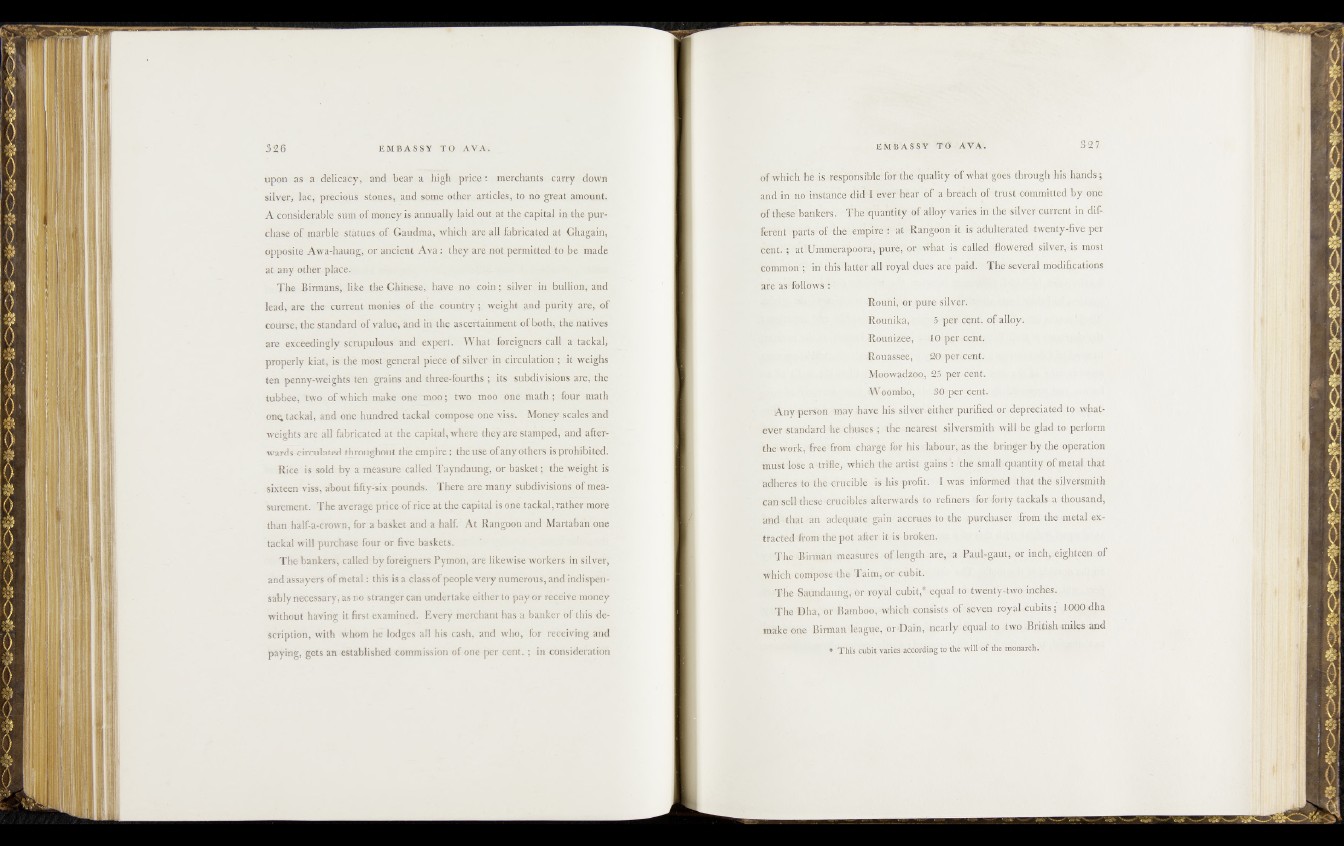
Uponas a delicacy, and te a r a high p rie e : merchants- carry dw ii
silver, lac, piiaciaiis st&BBSy and s tm e other, articles, W D© great' »mount,
A congMegable sum ef money is a nnu all y 1 a id « # . # . thecapital iaiffefta#*
chase of marble statues of Gaudma, vthieh are all fabricated at Chagain,
opposite AwMwwj§> or ancieut Ava: thdjf are net permittedko he na&de
at any other place.
Tbs BirjAaBS. lite the Chinese, have no coin; silver in bulfioavahd
lead, are the-current monies of the country; weight and purity are, of
course, the standard of value, and in the ascertainment of both, the natives
are exceedingly scrupulous and expert. What foreigners call a tackal,
properly kiat, is the most’general piece of silver in circulation ; it weighs
ten penny-weights ten grains and three-fourths ; its subdivisions are, the
lubbee, two of which make one moo; two moo one m a th ; four math
onq. tackal, and one hundred tackal compose one viss. Money scales and
weights are all' fabricated at the capital, where they are stamped, and afterwards
circulated throughout the empire 1 the use of any others is prohibited.
Rice is sold by a measure called Tayndaung, or basket; the weight is
sixteen viss, about fifty-six pounds. There are many subdivisions- of measurement.
The average price of rice at the capital is one .tackal, rather more
than half-a-crown, for a basket and a half. At Rangoon.and Martaban one
tackal will purchase four or five baskets.
The bankers, called by foreigners Pyrrron, are likewise workers in silver,
and assayers of metal: this is a class of people very numerous, and indispensably
necessary, as no stranger can undertake either to pay or receive money
without having it first examined. Every merchant has a hanker of this description,
with whom he lodges all his cash, and who, for receiving and
paying, gets an established ^commission of one per cent. ; in consideration
I f ^& c h 4 f ferpd|hws'hands-;
pæ^l'in no "IMfhidehiJd . evès-%ed^hE%L|brJâèh dm^a^efeipa-ktednv one
Ehtufiuai'ft'p^"(0r^)v»t tuts m th o v d h tr-iu ii-cn i^ ri:h |||
Fefent paHshfi^hé;''ëiâ^ë*?,''i^^M>g(k)n’iiÎÉ4 isf4&tilter‘stteâ ■tyvbptydîveper
'c e n t.^ lU t tif f le r i^ o d ^ ^ d ^ ^ o ^ p ia t - 'is most
‘^Mhrtibn-; fMsdat-tef âlfîrHy&l dues^pl pM^'T'hd-Sev-pr^L.pJodifipa'tions
are 'âsJïdfIçfeM>'' ’ 1
, RoutîiM4 ?’i>f’ 5
' RouiMzëé, 10 p ^ ^ è i ^ j ’l.i'
. v ';4®<fÿïspetoibp
Moowadzoo, 2,5 per cent, ijli
Wèôtaho, - 'ig%peti^ent:,i^|(
~.Anyife?soH.-'«»y hâve his sdv«r'.ekher^dfio'fw'-dfipreæiat©45taîais^i3t>
«ver .-Standard ’hetbaseS>', the -.nearest sdversmkh •wiflille ^ t d - ’to perform
lfoePWer1k,j(freei froth 'charge for his 4âfe0ur’,ias4he teir^etdb^ÜSë- operation
Sai$t lM | a trifle, wbiefl'the^ti^-gaiüs»1:4 h ë 4 ^ J h ^ a g fe tti^ r fmetal.that
adheres.to the-ernciblé *s hisprefit. I was informed ithafcdhd'silv.er.smifch
Èan selthese'.eÿüoïbles.àfterwavds t® refiners doiîïfesty tadbtls. atAhousand;
and that an adequate gain accrues to the purchaser from the metal extracted
from the pot after it is broken. - • -
y ;The -#irmanimea>sures «ÿilesgth.aæe, a i?apkgauitr .or kah,ueîgkteé»waf
which nôrftp&se^h'e.'T.ainif'<M;'|cübit.
s^sphe Saundaungj-êr ,rsyal-Gubit,î>.equajI Y® twenty’,twb->fn®hk,lpjjf
\ ‘"The © h a , w jlBambGO,^hich-Jeofe^ts n f% y ç p ,; | lo y ,d qubits ; lQQ@dha
mE&edM B im n 4eagd®»«rjDa«i, «eartytèqusUo two .British amies and
* ‘This cùfcit varies according to thè‘dii™Çtrfe'nronarch.